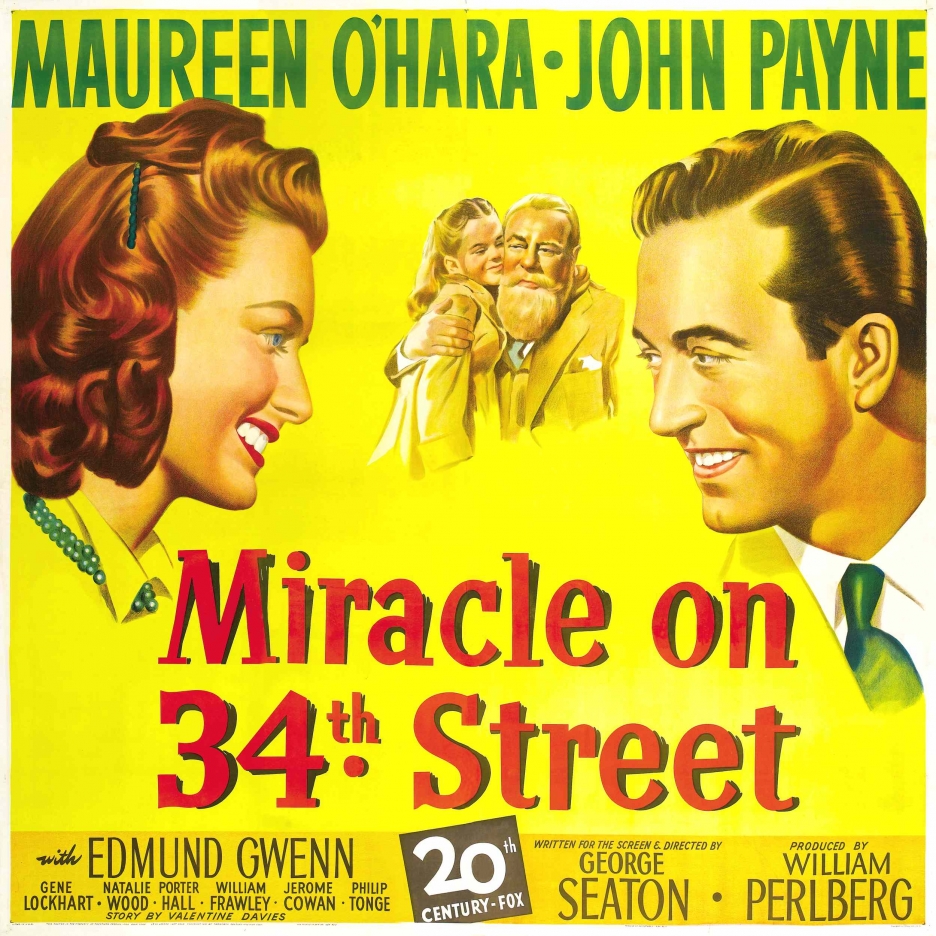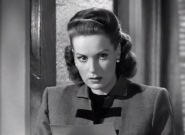In "The Honoraries" we're looking at the careers of this year's Honorary Oscar recipients including Maureen O'Hara. Here's Andrew on a holiday favorite...

A common criticism meted out against Maureen O’Hara is that she’s often in good films but hardly ever the reason the films are great. In this vein, it’s almost wicked that I chose to write on her work in Miracle on 34th Street, in our celebration. Maureen O’Hara is probably not the first image that comes to mind when you think of this immortal Christmas classic. Your mind probably went instantly to holiday charm, Macy’s consumerism, Natalie Wood's lovely child star turn or Edmund Gwenn’s Oscar-winning Kris Kringle performance.
Still, I find Maureen's place in the movie significant.
 A little background: before shooting Miracle on 34th Street, O’Hara had recently moved to Ireland and was essentially forced into taking the role of Doris Walker, the mother who encourages her daughter not to believe in Santa Clause. The film was called The Big Heart at the time and she was not enthusiastic about returning to North America to shoot it. However, once she read the script her sentiments changed and she was immediately keen to co-star. Just what it was about the role that made Maureen so immediately enthusiastic to be a part of the project? [More...]
A little background: before shooting Miracle on 34th Street, O’Hara had recently moved to Ireland and was essentially forced into taking the role of Doris Walker, the mother who encourages her daughter not to believe in Santa Clause. The film was called The Big Heart at the time and she was not enthusiastic about returning to North America to shoot it. However, once she read the script her sentiments changed and she was immediately keen to co-star. Just what it was about the role that made Maureen so immediately enthusiastic to be a part of the project? [More...]
"The first thing I did was read the script that I was so urgently brought back to make...My mood changed as soon as I finished reading the script. I knew the movie was going to be a hit.”
Mauren's enthusiasm aside, it's hard to deny that her role is not particularly nuanced. And the movie's sentiment isn't easy for us skeptics, particularly abroad. The idea of Santa Clause/Kris Kringle as the root of Christmas has always emerged as an especially Western phenom. But watching the film with no attachment to its Christmas cheer allows you to observe it on more critical terms.
Certainly, Doris is not a character of much depth but there’s usually something informative about watching actors navigate roles that don’t give them much to work with. Like the majority of the adults in the film, Miracle on 34th Street isn’t very happy with Doris. It doesn’t villainize her, exactly but even now it’s discernible that her agnoticism is meant to be just a bit more curious because she’s a woman. Maureen’s indelible contribution to the film is in the way she's left to carve her own ambiguities into a flat representational role: the non-believer. It’s there in her fond exasperation with Kris Kringle, her reluctantly charmed disposition around John Payne and her great chemistry with Wood (who O’Hara calls her favourite on-screen child).
The romance is negligible, though, because the mother/daughter rapport is the focal point of the film. The text of the film offers little but Maureen’s face adds subtext. Take Doris’ decision to write “I believe” in Susan's letter to Kris, for example. On the surface level it’s easy to read it as a simple change of heart, where theworking mother comes around, but as played by Maureen it seems just as logical to read it as a mother’s willingness to submerge her own inclinations for the peace of mind of her child. Her face is inscrutable. Who can tell what she's thinking?


It's wonderful when an actor creates tension where the script offers little. From the conversation with Susan onwards Maureen almost seems to negate the argument of whether Kris Kringle is Santa, or not, and the film becomes a rumination on parenting. Are Maureen's valiant attempts to add texture to the role part of the reason it endures? I'm not sure. In remembering the film TCM’s website includes this titbit, Maureen O'Hara nicely summed up what the film had come to mean to her over the years.
Everyone felt the magic on the set and we all knew we were creating something special, I am very proud to have been part of a film that has been continually shown and loved all over the world... Miracle on 34th Street has endured all this time because of the special relationship of the cast and crew, the uplifting story and its message of hope and love, which steals hearts all over the world every year. I don't think I will ever tire of children asking me, 'Are you the lady who knows Santa Claus?' I always answer, 'Yes, I am. What would you like me to tell him?'"
Looking with these skeptic's eyes I can’t say I love Miracle on 34th Street. But the ethos of encouraging people (especially children) to believe in the idealistic despite one's own doubt is the biggest thing adult me takes away from seeing it. Maureen may fade into the background, but her willingness to invest in the tale of Kris Kringle for her daughter becomes paramount. It's not the flashiest part of the film, true, but, that's unsurprising since so much of Maureen's filmography lives and breathes in the quieter spaces. Being less flashy has never meant being less important. Thankfully Oscar realized this in time to present her with this Honorary Oscar.

Previously on The Honoraries:
Hayao Miyazaki
Belafonte in Beetlejuice
Belafonte in Carmen Jones
O'Hara in The Parent Trap
O'Hara in Black Swan
O'Hara in The Hunchback of Notre Dame